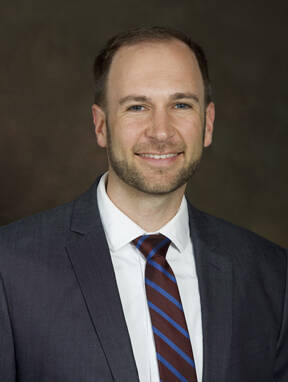
Cole
CEDARVILLE — The Cedarville University School of Pharmacy aims to be at the forefront of research and innovation, and nothing conveys this dedication more than the Center for Pharmacy Innovation (CPI).
First launched at the start of 2018, the Center for Pharmacy Innovation serves as a research and collaboration space that uses professional pharmacists’ knowledge and experience to find new methods and avenues for improving health care in the United States.
The Center for Pharmacy Innovation is headed by director Dr. Justin Cole, who also has served as chair of pharmacy practice since 2019.
“Our mission is to transform health care by equipping future and current pharmacists to use their God-given creativity to innovatively enhance patient care and improve community health,” said Cole. “Our vision is that we would glorify God by becoming a nationally recognized center for pharmacy innovation.”
The Center for Pharmacy Innovation ensures that the students at Cedarville are central to everything it accomplishes. Four pharmacy students are hired as student innovators and are tasked with various roles to advance the CPI’s mission, such as helping to produce the DISRxUPT Podcast, maintaining the center’s blog and performing other outward-facing tasks.
The other aim of using student innovators is twofold: It offers students the chance to partner with other members in the healthcare space to give them meaningful work supporting innovators in the field while also giving them experience and a chance to expand their network with other innovators. This allows Cedarville students to work in their fields alongside established pharmacists and health care professionals who also seek to radically transform health care for the better. These projects both highlight students’ abilities to contribute to innovation and show Cedarville’s ability to collaborate with other entities in a meaningful way.
One of these successful projects undertaken by the CPI was with the Dayton-Montgomery Public Health Department to utilize the approach of academic detailing to change the opioid prescribing habits of prescribers in the region. As one of the main centers for the opioid crisis in the Midwest, the county sought a solution that could dramatically change the landscape of opioids through changes at the pharmacy level.
While the project was overseen by public health, they sought partners to come alongside in training to be the ones to go out to the field to speak to physicians and other prescribers. The Center for Pharmacy Innovation was chosen to be one of those partners, and Cedarville students were trained to enter the field as academic detailers.
“More than anything, the feedback we received about our students’ performance was that while they had other health care providers participating in the project, they said that our pharmacy students particularly excelled in their ability to both do the groundwork and communicate with prescribers,” said Cole. “I was particularly proud of that because it showed the capability of our students to change the paradigm of health care in our region while showing our ability to collaborate.”
Other examples of student collaboration through the Center for Pharmacy Innovation include working with the Ohio Pharmacist Association during COVID, contributing to research on smoking cessation services provided by pharmacists and even helping create a video series on Pharmacist Provider status that was shared nationally. The Center for Pharmacy Innovation continues to plug students into meaningful projects advancing change in health care for the betterment of society while remaining true to the Word of God.
“What if the leaders in health care not only were trained to think about new ideas, to pursue new ideas and test them to better the health of others but were also trained to innovate from a worldview that was tested and grounded by the Word of God?” Cole said. “I truly believe that when we think about health care from a Christian worldview, we understand how to best deliver care because we truly believe that every person is made in the image of God. Because each person is uniquely valuable to God, we have a distinct calling to care for them holistically — mind, body and soul.”

